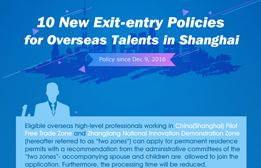Shanghai’s entrepreneurship policies Q&A
Shanghai's official micro-blog, launched by the municipal government's news office, interviewed Chen Jie, deputy director of the city’s science and technology committee, about hot issues such as the new scientific and technological innovation coupon, measures supporting student's entrepreneurship, makerspace, and preferential policies for science companies.
Q1: What is scientific and technological innovation coupon? And how can it be applied for?
Chen Jie: The coupon is for small and medium-sized enterprises and entrepreneurship teams to use the city's public scientific research resources for free, which helps lower their innovation costs. Companies that want to apply can visit the Shanghai R&D Public Service website (http://www.sgst.cn/), and will get results in five days.
Q 2: How does the government support students to start up their own businesses?
Chen Jie: First, university students who meet certain requirements can get free training on preferential policies, government guarantees for interest-free loans and tax relief. Second, the Shanghai Technology Entrepreneurship Foundation for Graduates was established in 2006 to help entrepreneurship teams nurture their projects. Third, free mentors, risk evaluation and instruction will be offered for the entrepreneurship projects.
Q3: Will the innovation and entrepreneurship competition be launched this year? Who can participate?
Chen Jie: The competition will be held this year. Last year, it attracted more than 3,000 companies and entrepreneurship teams and nearly 640 investment institutions last year. It targets small and micro-sized startup companies and entrepreneurship teams. Its aim is to enable the participants to gain something from the guidance and training of the mentors, most of whom are investors.
Q4: Will the makerspace be granted more functions?
Chen Jie: The makerspace is developed from the traditional business incubator. Instead of only focusing on the physical space, it now has more functions as a cyberspace, social contact platform, resource sharing site, where startups can get more help and cooperation. So far, Shanghai has more than450 makerspaces, with two – Suhehui and Shenze incubators – getting listed on the New Third Board.
Q 5: What is the best way to transfer scientific technology?
Chen Jie: The new policy on technology transfer includes five parts: first, to define the rights and interests of and incentives on scientific technologies; second, to promote the development of intermediary services for scientific technology; third, to improve ways of fiscal support; fourth, to enhance the cultivation of technology transfer professionals; and fifth, to strengthen the protection of legitimate rights and interests of technology transfer.
Q 6: How much will the subsidies of the Venus Program and Sailing Program increase?
Chen Jie: We will keep developing these two programs. The Venus Program funds a certain number of young scientists under the age of 35 every year and its subsidy for a single project will rise from 100,000 yuan ($15,000) to 200,000 yuan. The Sailing Program offers financial support to young science talents under the age of 32 and its subsidy for a single project will double to 400,000 yuan. Shanghai’s natural science foundationwill increase its subsidy for a single project from 100,000 yuan to 200,000 yuan to encourage interdisciplinary scientific studies.
Q 7: Can universities and research institutes cooperate with makerspaces?
Chen Jie: Absolutely. We are considering building a batch of entrepreneurship communities at areas that have good living facilities and next to universities and research institutes. This will help give startups access to resources of universities and research institutes, such as science data, key laboratories and technology centers.
Q 8: What kind of preferential policies can technology companies enjoy in Shanghai?
Chen Jie: There are preferential taxation policies, such as R&D cost deduction, high-tech enterprise identification, and technology-advanced service company identification, as well as science and technology financial policies, such as science credit products, and the launch of N-board, a high-tech trading platform for innovative startups by the Shanghai Stock Exchange.
Q 9: What is the plan for the promotion of science popularization?
Chen Jie: We plan to build more science popularization venues to give local citizens better services, organize more activities such as science and technology festivals to popularize science knowledge, as well as use the Internet to expand the service range of science popularization. Our goal in 2017 is for 30 percent of the population with great science literacy.

 Print
Print Mail
Mail




